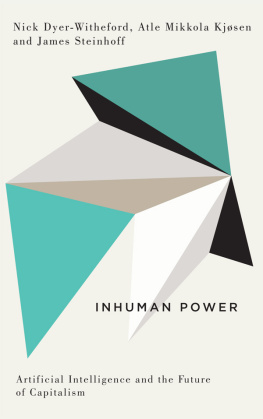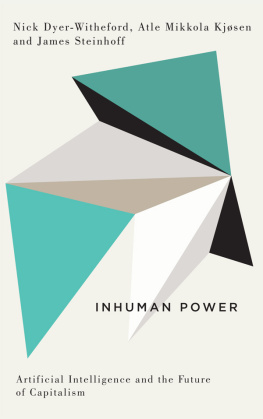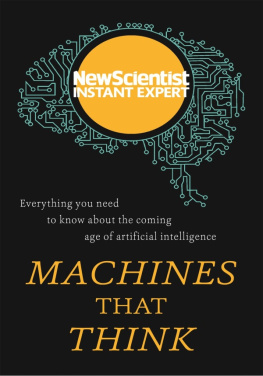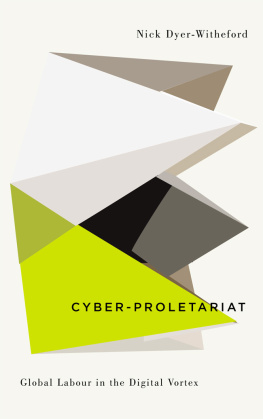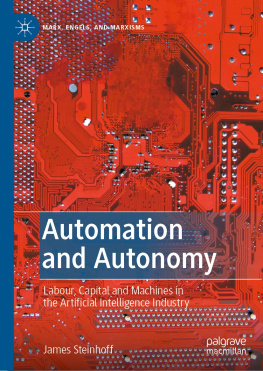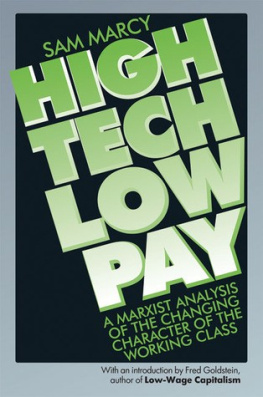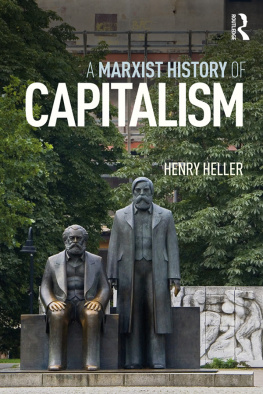Contents
Guide
Inhuman Power
Digital Barricades:
Interventions in Digital Culture and Politics
Series editors:
Professor Jodi Dean, Hobart and William Smith Colleges
Dr Joss Hands, Newcastle University
Professor Tim Jordan, University of Sussex
Also available:
Shooting a Revolution:
Visual Media and Warfare in Syria
Donatella Della Ratta
Cyber-Proletariat:
Global Labour in the Digital Vortex
Nick Dyer-Witheford
The Digital Party:
Political Organisation and Online Democracy
Paolo Gerbaudo
Gadget Consciousness:
Collective Thought, Will and Action in the Age of Social Media
Joss Hands
Information Politics:
Liberation and Exploitation in the Digital Society
Tim Jordan
Sad by Design:
On Platform Nihilism
Geert Lovink
Unreal Objects:
Digital Materialities, Technoscientific Projects and Political Realities
Kate ORiordan
Inhuman Power
Artificial Intelligence and
the Future of Capitalism
Nick Dyer-Witheford, Atle Mikkola Kjsen and James Steinhoff

First published 2019 by Pluto Press
345 Archway Road, London N6 5AA
www.plutobooks.com
Copyright Nick Dyer-Witheford, Atle Mikkola Kjsen and James Steinhoff 2019
The right of Nick Dyer-Witheford, Atle Mikkola Kjsen and James Steinhoff to be identified as the authors of this work has been asserted by them in accordance with the Copyright, Designs and Patents Act 1988.
British Library Cataloguing in Publication Data
A catalogue record for this book is available from the British Library
ISBN 978 0 7453 3861 3 Hardback
ISBN 978 0 7453 3860 6 Paperback
ISBN 978 1 7868 0395 5 PDF eBook
ISBN 978 1 7868 0397 9 Kindle eBook
ISBN 978 1 7868 0396 2 EPUB eBook
This book is printed on paper suitable for recycling and made from fully managed and sustained forest sources. Logging, pulping and manufacturing processes are expected to conform to the environmental standards of the country of origin.
Typeset by Stanford DTP Services, Northampton, England
Simultaneously printed in the United Kingdom and United States of America
Contents
Series Preface
Crisis and conflict open up opportunities for liberation. In the early twenty-first century, these moments are marked by struggles enacted over and across the boundaries of the virtual, the digital, the actual and the real. Digital cultures and politics connect people even as they simultaneously place them under surveillance and allow their lives to be mined for advertising. This series aims to intervene in such cultural and political conjunctures. It features critical explorations of the new terrains and practices of resistance, producing critical and informed explorations of the possibilities for revolt and liberation.
Emerging research on digital cultures and politics investigates the effects of the widespread digitisation of increasing numbers of cultural objects, the new channels of communication swirling around us and the changing means of producing, remixing and distributing digital objects. This research tends to oscillate between agendas of hope, that make remarkable claims for increased participation, and agendas of fear, that assume expanded repression and commodification. To avoid the opposites of hope and fear, the books in this series aggregate around the idea of the barricade. As sources of enclosure as well as defences for liberated space, barricades are erected where struggles are fierce and the stakes are high. They are necessarily partisan divides, different politicizations and deployments of a common surface. In this sense, new media objects, their networked circuits and settings, as well as their material, informational and biological carriers all act as digital barricades.
Jodi Dean, Joss Hands and Tim Jordan
Acknowledgements
The authors thank each other for a collegial and comradely collaboration. We thank the organizers of the Das Kapital at 150: Marxs Critique of Political Economy and the Global Crisis Today conference at Hofstra University in April 2017, where a panel presentation gave us our first opportunity to articulate some of these ideas. We also thank the organizers of the conference Log Out! Worker Resistance Within and Against the Platform Economy, held on 6 March 2018 at the University of Toronto, which inspired much of the Heptagon of Struggles section of . We thank David Castle for so immediately, and then patiently, supporting publication of this book, and the staff at Pluto for their work on it.
Nick Dyer-Witheford thanks his dear wife Anne for countenancing and enlivening the writing of another book. Atle Mikkola Kjsen thanks his lovely partner Siobhan for all her support and companionship throughout the writing process. James Steinhoff thanks Marcello Guarini, Stephen Pender, Jeff Noonan, Deborah Cook, Philip Rose and Chris Tindale for helping him grow a brain.
Introduction: AI-Capital
THE MOST VALUABLE THING
Capitalism is today possessed by the Artificial Intelligence (AI) question. Consider the Vancouver start-up Sanctuary Cognitive Systems Corporation, which aims to develop humanoid robots that can move, speak and think for themselves and interact as intellectual peers with real people. Its owner, Geordie Rose, a quantum computing pioneer, concedes to an interviewer that, while building blocks towards this goal are already in common use in multiplying types of narrow AI and specialized robotics applications, none are remotely close to an Artificial General Intelligence (AGI) capable of full human emulation. His companys mission to unlock how human intelligence works and to replicate it on a mass scale therefore sounds like a mind-boggling moonshot. However, Rose is undeterred, for if he succeeds, it will be the most valuable thing ever created. What were talking about is fundamentally altering the basis of capitalism itself (Silicoff 2018).
It would be easy to dismiss this quest, were Sanctuary not competing against some of the most powerful capitalists in the world, also striving to produce AGI and related technologies: Elon Musk and his non-profit OpenAI; Vicarious FPC, Inc., backed by Samsung and technology billionaires Mark Zuckerberg and Jeff Bezos; and DeepMind Technologies, acquired by Google/Alphabet, whose owners, Sergei Brin and Larry Page, are patrons of the transhumanist Raymond Kurzweil (2005a), the most famous prophet of a technological singularity in which computers attain human-equivalent intelligence. Sanctuary Cognitive Systems Corp may or may not survive (it is clearly cash-strapped and looking for angel investors). But its story of soaring technological ambition, mission-driven digital entrepreneurship and creepy androids like underworld creatures from a Hieronymus Bosch painting (Silicoff 2018) is symptomatic of the AI-fever sweeping the world market, a fever that also manifests in a burgeoning business literature on AI applications, torrents of conflicting predictions about AIs consequences for employment, utopian speculation on the creation of Life 3.0 (Tegmark 2017), and fictions ranging from pulp robo-apocalypses (Wilson 2012, 2015) to complex literary explorations on the new techno-existential horizon posited by AI (Mason 2017).

